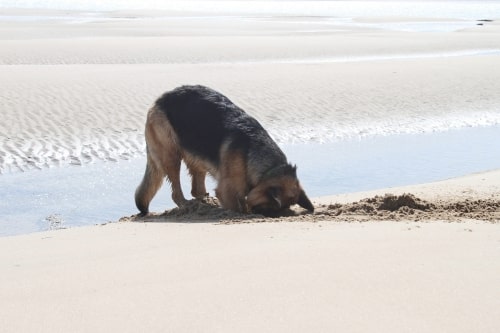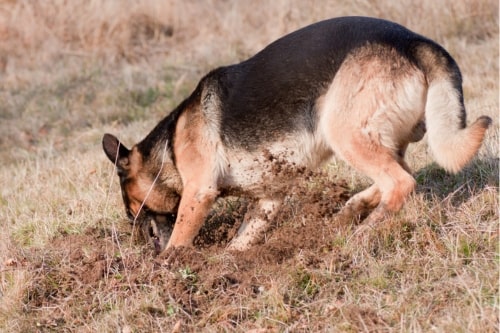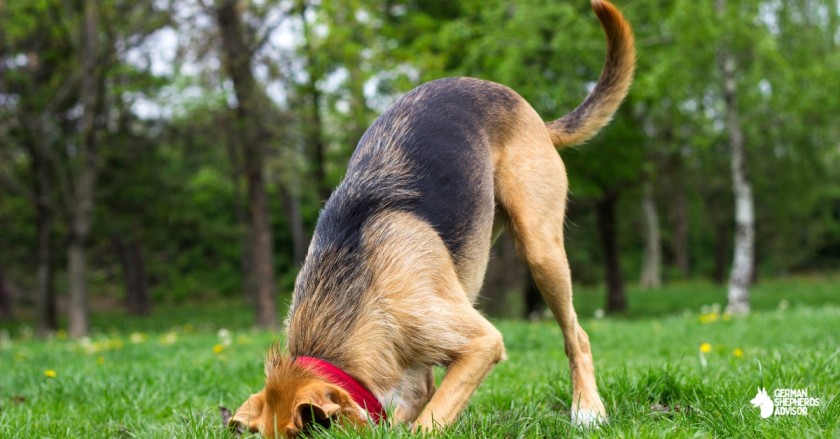I wouldn’t call them ‘holes’ exactly. They are more like ‘pits’. And she isn’t really digging them, either. She paws at the ground making a hole that is about half as deep as I am tall. Sometimes it is right up against the fence which borders our neighbor’s yard and sometimes it is under the shade of a tree – but always close to where I last saw her sleeping or resting. Since she has been spayed, this behavior seems even more curious because there are no puppies here to bury!
How do I stop my German Shepherd from digging?
Digging is a natural behavior in canines. While your dog may have started digging for fun, it’s more than likely they are looking for something to occupy their time with. A variation of the reason why dogs dig is because they are looking for companionship in the form of another canine digging next to them, or they are trying to escape from confinement. Most often it is instinctual by nature rather than done out of spite or boredom.
At any rate, there are two things you should know about your dog’s behavior:
1) Digging can stop whenever you want it to stop. If your Shep has dug holes in your yard, all you have to do is fill them in and tell him ‘no’ when he goes near them.
2) Digging has a purpose, and it is up to you to make sure that your dog’s needs are met. If your German Shepherd doesn’t get his exercise, he will do the only thing left for him; dig holes in your backyard until he gets tired.
It may be difficult at first to stop your German Shepherd from digging but keep in mind that dogs like humans too often resort to negative behavior when they don’t receive any positive reinforcement. It also helps if you cooperate with other members of the family; sometimes this means sharing the responsibility equally by taking turns walking or playing with your GSD. Keeping your puppy occupied is one of the best things you can do as their owner…digging? Not so much.
But how…?
Always remember to provide your dog with the exercise they need to remain healthy and happy; this is especially true if you’re not home for most of the day. This will help prevent boredom and destructive behavior such as excessive barking or digging. Playtime walks (leashed), and chew toys are all great ways to keep your Shep busy while you’re away!
“How do you punish a dog for digging?” is a question that often comes up among new pet owners. The answer really depends on the severity of the dig and what you are trying to accomplish. Some dogs will simply stop the behavior if they are scolded, while others could use more intensive training.
When dealing with an indoor or outdoor pen, it’s best not to punish your pup at all because he does not know any better. Instead, set boundaries by using plastic fencing or rocks to prevent him from getting away from his safe place. Most pets will not try hard enough to escape when there is something blocking them from doing so.
A word of warning: be sure to properly train your dog before leaving him alone in a fenced area.
A simple reprimand is usually enough to deter a dog from digging in your yard, but what do you do if he still tries to escape? While it is not recommended that you use physical force on any animal, you can try covering up his hole with rocks or dirt. If he tries digging again soon after, begin training him with an anti-digging spray. This type of deterrent often works for dogs because they are aware of their surroundings and react accordingly when something smells off.
Once your pup gets used to the smell, simply train him by saying “no-dig” every time he begins scratching the ground. Eventually, he will realize that this behavior makes you unhappy and give up before anything bad happens.

If your dog digs holes to escape, utilize an electronic or citronella anti-digging device. These tools work by playing an unpleasant sound or releasing a burst of unpleasant smell that deters dogs from digging. While many dogs are initially startled by the noise, most will get used to it and stop their activity. Most brands come with adjustable sensitivity levels; start out strong and diminish the volume if needed.
When using these devices, be sure not to leave them on for extended periods of time because this may make your pet more nervous than before. If you live in areas where dogs dig frequently due to warm weather, look for weatherproof models that can withstand rain and sunshine without rusting over time.
Alternatively, simply keep a close eye on your dog for the first few days that you have him. Make sure he is comfortable around his new home and has plenty of toys to play with, then watch how he interacts with dirt or rocks outside. Dogs who are kept occupied will not feel pangs of loneliness as strongly as those left alone for too long.
Once you figure out why your dog digs, take steps to work it out before training him to stop the behavior completely.
Why is my female dog digging holes all of a sudden?
There are many possible reasons for dogs digging holes. Most of them have to do with marking, mental stimulation, stress relief/ boredom, excitement and instinctive behavior.
Digging is often an indication that your dog needs more exercise or mental stimulation. Even if you happen to have a yard for your pet, it doesn’t mean they are getting the proper amount of exercise each day. Playtime inside can become boring after a while so dogs will seek out other ways to entertain themselves such as digging in the dirt, chewing shoes, and even barking incessantly at nothing! If left alone outside on a consistent basis without appropriate outlets for energy and attention (which is usually the case) dogs will continue these behaviors until they escalate into more destructive actions like chewing on furniture, digging holes in the yard, and even escaping from an enclosed yard.
Stress factor
On a side note, sometimes dogs will dig out of boredom or stress relief just to have a little fun! This is often done when owners are away at work all day and your pup is stuck inside during a summer heatwave. The ground can be much cooler than a tile floor so they choose outside over being cooped up inside the house. Some dogs need more attention than others so this can lead to separation anxiety which causes further destruction to your home once you leave them alone too long. After a while, your pup won’t care if they destroy any piece of furniture because it’s useless until you come back anyway!
Sometimes, but not always, digging behavior can be traced back to instinctual behavior. Dog’s that are bred of hunters or who were born to be working dogs have more of an instinctive need to dig than other breeds. They are often genetically prone to digging up prey underground, burying found objects, and even using dirt for a bed! If your dog came from a long line of hunting dogs they might have more of an inclination to get dirty so be sure you provide them with longer playtimes outside in the dirt rather than expecting them to behave like house.
Here are some tips on how to stop digging behavior:
– Limit their access outdoors during hot weather unless you’re out there playing with them. When it gets too hot for us humans, it’s probably too hot for our pets too.
– If you think your pet is digging in the yard because they are bored, give them a toy to play with when they can’t get out of the house or a pen to sleep in. Or try sprinkling some favorite treats in there for them!
– Try providing easily accessible “digging” areas in a couple places in your yard so your dog doesn’t become reliant on one area only. Be sure you know where these areas are before making this changes though!

– Dogs dig up holes for many reasons, including finding cool spots during hot days, marking their territory and simply for fun. Once you understand the reason behind it, make small changes to help stop it from happening. Keep their toys inside and don’t let them out in the yard unless you’re there playing with them. If you think it’s because of marking, try bringing them inside after they go potty so they can’t mark their territory on anything outside.
– You may also want to put down some “dig resistant” paint if your pup continues to dig for more than an hour at a time. Remember that this type of behavior is often done when there isn’t enough exercise or mental stimulation in their lives, so be sure to continue providing plenty of both!
If you have tried all of these suggestions and you still struggle with getting your dog to stop digging, don’t give up hope just yet! There are other options available such as erasing their scent from certain areas in your yard.
Is it OK if my dog digs holes?
Many people wonder if letting their pets dig holes is all right. The answer really depends on why your dog is digging and where he’s digging. If you’re unsure, here are some ways to tell what’s normal canine behavior around the hole-digging front.
Is your pup just trying to cool off in the summertime by digging a hole into which he can flop down into after a long day of playing? Is she tired out from chasing squirrels up and down the fence line in the backyard? Dogs have been known to take themselves outside in order to get a bit of quiet time so that they can rest without being bothered by children or other pets. This kind of digging is typically only a problem when it is in an area where the dog has access to flower beds, mulch, and other ornamental plantings.
If you’re dealing with a digging machine in your backyard who’s tearing up all of your prized flowers, you may be able to divert some of that energy by encouraging play with balls or Frisbees. Puzzle toys are also great for keeping dogs from becoming bored inside their own homes during inclement weather. These interactive feeders will require him to move the toy around in order to get his dinner, which is both mentally stimulating and perhaps a little bit less destructive than relentless digging.
FAQS?
How to help your dog learn not to dig in certain areas?
Is your pooch outfitted with a special collar that delivers a mild static charge when he starts to dig? This training technique can be effective in helping your dog learn not to dig in certain areas, but it’s only part of the solution if your pup continues to chew on things he shouldn’t.
How to deal with a puppy who is playful?
If you’re dealing with a puppy who wants to play in the dirt or is simply curious about the world around her, you may want to put up some fencing or erect an outdoor barrier so that she has more space for exploring. If you don’t have enough room in the backyard, designated digging zones can help contain this type of behavior without sacrificing too much valuable space.

